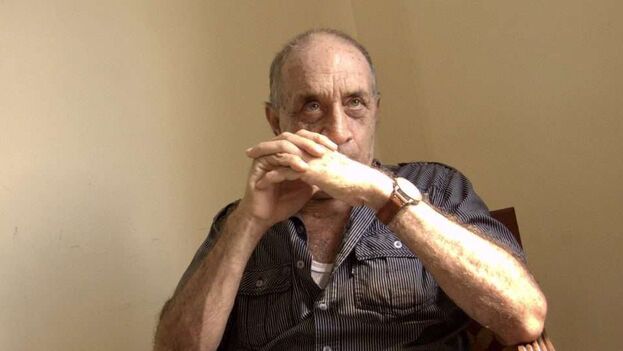
![]() 14ymedio, Xavier Carbonell, Salamanca, Spain, 29 December 2022 — The only mention of Delfín Prats in the Historia de la Literatura Cubana [History of Cuban Literature] is a piece of critical sanitation, a general cleansing. Lenguaje de mudos [Language of Mutes] (1968), explains the text, was “a book that, for short-term reasons derived from an extremely deficient cultural policy… did not circulate.” The following sentence, dedicated to the collection of poems, Para festejar el ascenso de Ícaro [Celebrating the Ascent of Icarus] (1987), is followed by a great ellipse of twenty years and, after another tasteless comment, a sudden cut, a silence.
14ymedio, Xavier Carbonell, Salamanca, Spain, 29 December 2022 — The only mention of Delfín Prats in the Historia de la Literatura Cubana [History of Cuban Literature] is a piece of critical sanitation, a general cleansing. Lenguaje de mudos [Language of Mutes] (1968), explains the text, was “a book that, for short-term reasons derived from an extremely deficient cultural policy… did not circulate.” The following sentence, dedicated to the collection of poems, Para festejar el ascenso de Ícaro [Celebrating the Ascent of Icarus] (1987), is followed by a great ellipse of twenty years and, after another tasteless comment, a sudden cut, a silence.
Published in 2008 and hatched much earlier, the third volume of this Historia – La Revolución (1959-1988), heroically reads the subtitle — is the most condescending and also the most ambiguous, because it does not refer to the deceased poets of modernism, nor to the chroniclers of war or even to the old authors trampled by Castro’s memory. If Volumes I and II are the “Cuban Book of the Dead,” Volume III is the “Book of the Living” and — as in the apocalypse — only those whose names are inscribed in its pages will be saved.
Time did not allow me to meet Delfín Prats, but I did get to know his contemporaries in Santa Clara, that charming city of poet-spies, chameleon editors, portable storytellers and professional flatterers. There his name was invoked by authors who had produced, after 1970, mediocre books with some daring ideas – more sexual than political — which fell under the scythe of the parametradores* [censors].
They presented themselves with those war wounds, just before clearly drawing the border between then and now. Justice had been done to them and, if there were mistakes, they were always personal, of a barely “defective” cultural policy. If they hated someone, it was Pavón or his provincial tyrants. It was not the Revolution that rejected them, it was the men.
The rehabilitation of Delfin Prats was, however, a more delicate operation and required tact. The documentary Entre el esplendor y el caos [Between Splendor and Chaos] — it was never known if it was an independent film or a commission from the Holguín telecenter — brought to light the image of a trembling writer, of a bohemian past and Soviet days, who resorted to rum as an anesthetic and isolation as the only way to survive.
Prats commented on his nights in Havana — avoiding mentioning Reinaldo Arenas, for whom he was a friend and finally a whistleblower — and warned the journalist not to put much pressure on him: “If I see a threatening situation, I get drunk and fade into the background.”
The scars that the Five Grey Years and the following decades left on Delfin Prats were not easy to hide. How to appease that nervous subject, who said on television: “If you ban a book in your country, those who are outside want to win over the author to their cause. And then, “it is possible that for some years it was thought that I, because of those open approaches of my youth, was going to be a poet of dissent.”
Luckily, his survival instinct led him to nuance everything, and he retouched the phrases like the most experienced censor. “Over the years you learn that you don’t have to dissent.” And also: “The poet only has to take care of his words.” As for the rest, “it’s better to leave it to the politicians.”
It has shocked me to see the Prats who won — in the opinion of those who kicked, spied on and lobotomized him — the National Prize for Literature. He remained impeccable. He is an old man in a blue guayabera, more wrinkled, if possible, gray and finally still. He is different from the cursed poet of the documentary, the young man who wore a ushanka [Russian fur hat] in Moscow and, of course, that boy who claimed to be called Hiram, to hunt his lovers on La Rampa.
“It is the testimony of a wreck, the shreds of a man,” Jorge Ferrer wrote on Wednesday, when he learned of the prize that was just given to Prats and that he, cowardly, had accepted.
Delfín Prats – “alcoholic and depleted,” according to Arenas – after the exhaustive and late cleansing of his memory, will finally be able to spout that “he always had someone powerful interceding.”
*Translator’s note: *Parametrados / parametracion: From the word “parameters.” Parametracion (parameterization) is a process of establishing parameters and declaring anyone who falls outside them (the parametrados) to be what is commonly translated as “misfits” or “marginalized.” This is a process much harsher than implied by these terms in English. The process is akin to the McCarthy witch hunts and black lists and is used, for example, to purge the ranks of teachers, or even to imprison people.
Translated by Regina Anavy
____________
COLLABORATE WITH OUR WORK: The 14ymedio team is committed to practicing serious journalism that reflects Cuba’s reality in all its depth. Thank you for joining us on this long journey. We invite you to continue supporting us by becoming a member of 14ymedio now. Together we can continue transforming journalism in Cuba.
